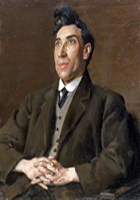A Plain Life Poem by William Henry Davies
A Plain Life
No idle gold -- since this fine sun, my friend,
Is no mean miser, but doth freely spend.
No prescious stones -- since these green mornings show,
Without a charge, their pearls where'er I go.
No lifeless books -- since birds with their sweet tongues
Will read aloud to me their happier songs.
No painted scenes -- since clouds can change their skies
A hundred times a day to please my eyes.
No headstrong wine -- since, when I drink, the spring
Into my eager ears will softly sing.
No surplus clothes -- since every simple beast
Can teach me to be happy with the least.
I am certain that by the line 'No headstrong wine - since, when I drink, the spring into my eager ears will softly ring' refers to the fact that if one were to drink from a natural spring one would get to enjoy the atmosphere of the place, and hear the gentle burbling of the water. We can see from the poem's pattern that after the medial caesura (the line break) the rest of the stanza refers to a natural occurrence, as opposed to the traditional material pleasures.
we have no time to see the wolds beauty . thank you for the poem.#
Life in whatever form it is it has its own benefit. A plain life as it may appear a simple one to us avails invaluable pleasure to the one who leads it. Great poem.
This poem has not been translated into any other language yet.
I would like to translate this poem
Davies, I wish I knew what you mean by such a steep stanza, “No headstrong-since when I drink, the spring into my eager ears will softly ring.” Do you mean that after you drunk you had tinnitus (buzzing ears) ?